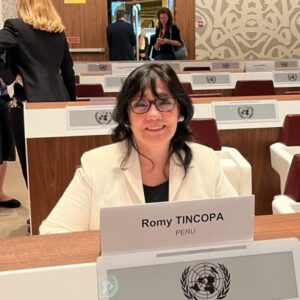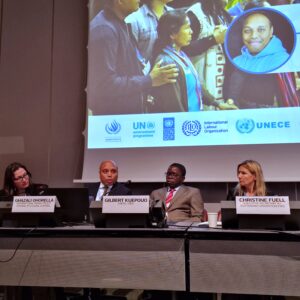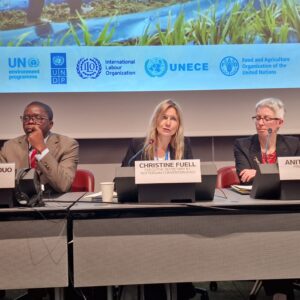Événement Conférence
Advancing a Human Rights-based Approach to Pollution for People and the Planet | BRS COPs 2023 Side Event

10 Mai 2023
13:15–14:45
Lieu: CICG | Room C & Online | Webex
Organisation: Haut commissariat des Nations Unies aux droits de l'homme, Programme des Nations Unies pour l'Environnement, Programme des Nations Unies pour le développement, Organisation Internationale du Travail, Commission économique pour l'Europe des Nations Unies, Organisation des Nations Unies pour l'alimentation et l'agriculture, Convention de Minamata, United Nations Environment Management Group, Geneva Environment Network
This side event to the 2023 Basel, Rotterdam and Stockholm Convention Conference of the Parties, explored recent developments of the interconnectedness between human rights, a just transition and the environment, and identified key entry points to strengthen a human rights-based approach to the implementation of the Basel, Rotterdam and Stockholm Conventions, as well as the Minamata Convention on Mercury, including ways in which human rights could be applied to accelerate the sound management of chemicals and waste.

About this Event
In July 2022, the General Assembly adopted a landmark resolution recognizing the human right to a clean, healthy, and sustainable environment. The resolution, which followed recognition of the right by the Human Rights Council in October 2021 was an unprecedented decision, adopted with unparalleled support (161 votes in favor, no votes against, and eight abstentions).
In March 2022, at the resumed fifth session of the UN Environment Assembly, Resolution 5/14 titled “End plastic pollution: towards an international legally binding instrument” was adopted, calling for the development of a legally binding instrument on plastic pollution, including in the marine environment, with the ambition to complete the negotiations by the end of 2024.
In June 2022, the International Labour Conference also adopted a resolution on the right to a safe and healthy working environment, supporting a just transition to a low-carbon world.
The adoption of these landmark resolutions is an important step in securing the enjoyment for all people of non-toxic environments in which to live, work, study and play and ensuring inclusive, evidence-based and accountable environmental action.
This side event to the 2023 Basel, Rotterdam and Stockholm Convention Conference of the Parties, explored recent developments of the interconnectedness between human rights, a just transition and the environment, and identified key entry points to strengthen a human rights-based approach to the implementation of the Basel, Rotterdam and Stockholm Conventions, as well as the Minamata Convention on Mercury, including ways in which human rights could be applied to accelerate the sound management of chemicals and waste.
Drawing upon the voices of key UN partners and activists, the panel shared specific examples of rights-based environmental action targeting pollution, and highlight how States can take more effective action through compliance with their obligations to respect, protect and fulfill human rights to meet their commitment and obligations under the Basel, Rotterdam and Stockholm Conventions, as well as the Minamata Convention on Mercury.
This side event is organized by the UN Office of the High Commissioner for Human Rights, UN Environment Programme, UN Development Programme, International Labour Organization, UN Economic Commission for Europe, Food and Agriculture Organization of the UN, Minamata Convention on Mercury, UN Environment Management Group, and the Geneva Environment Network.
Speakers
By order of intervention.

Anita BREYER
President, 5th session of the International Conference for Chemicals Management (ICCM5) | Germany

H.E. Amb. Romy TINCOPA
Deputy Permanent Representative, Permanent Mission of Peru to the international organizations in Geneva

Christine FUELL
Executive Secretary a.i. Rotterdam Convention (FAO)

Joaquim PINTADO NUNES
Chief, Labour Administration, Labour Inspection and Occupational Safety and Health Branch, ILO

Gilbert KUEPOUO
Executive Director, Research and Education Centre for Development | Steering Committee Member, IPEN, Cameroon

Shahriar HOSSAIN
Steering Committee Member, Scientists’ Coalition for an Effective Plastics Treaty | Steering Committee Member, IPEN, Bangladesh

Ghazali OHORELLA
Legal Counsel, International Indian Treaty Council

Ana Paula DE SOUZA
Human Rights Officer, Office of the High Commissioner for Human Rights | Moderator
Video
The event is livestreamed from CICG and via Webex.
Livestream from the room.
Highlights
Photo Gallery
Summary
Opening Remarks
Ana Paula DE SOUZA | Human Rights Officer, Office of the High Commissioner for Human Rights | Moderator
In July last year, the UN General Assembly adopted resolution 76/300, recognizing the human rights to a clean, healthy, and sustainable environment for all people. This resolution recognized that the impact of climate change, the unsustainable management and use of natural resources, the pollution of air, land, and water, and the unsound management of chemicals and waste have both direct and indirect negative implications for the effective enjoyment of our human rights. It also affirmed that the promotion of the human right to a healthy environment requires the full implementation of multilateral environmental agreements.
The adoption of this resolution, amongst other instruments in process that will be discussed here today, is an important step in securing the enjoyment for all people of non-toxic environments in which we live, work, study, and play, and ensuring evidence-based and accountable environmental action. The very reason we are here today, why treaties such as the Basel, Rotterdam, and Stockholm Conventions came to exist, is the recognition that we must protect human rights, human health, and the environment from toxic chemicals. We protect what is at risk of being harmed or what has been harmed, and we have enough evidence to establish that toxic chemicals are responsible for ongoing, massive human rights harms that negatively affect multiple aspects of human life and dignity. Reinforcing the interconnectedness between human rights, science, a just transition, and the environment is imperative if we are to tackle pollution, steering away from false solutions that do not have the interest of people at heart.
Panel Discussion
Anita BREYER | President, 5th session of the International Conference for Chemicals Management (ICCM5) | Germany
ICCM5 is a major milestone to confront the global chemicals and waste crisis. As pointed out by the special rapporteur on toxics and human rights, a structural change in approach, one based on human rights, is needed to avoid the adverse consequences of chemicals and waste on the planet and its people. With the preparations of ICCM5 in mind, how would you describe the main issues concerning the safe management of chemicals, bearing in mind their impact on human and planetary health? In other words, why is it key to act now?
When it comes to human rights and chemicals, one of the main human rights I can identify is the right to a healthy life, free from suffering from diseases caused by exposure to toxic chemicals. This could be through food or drinking water, consumer products, or in the workplace. To be more specific, we might consider the right of children to grow up without being impaired in their development by endocrine disruptors or toxic chemicals like lead, and their right to grow up as fully developed human beings.
There’s also the right to safe workplaces, being protected from harm. For example, farm workers should not be exposed to hazardous pesticides in their workplaces.
Human rights for a healthy and sustainable environment relate closely to the human rights for health that I described because the environment is a medium where chemicals travel. I’m thankful of the adoption of this goal of a human right to a healthy and sustainable environment. Three examples come to mind: (1) Mercury in gold mining practices. If the mercury ends up in rivers, it can poison the fish that live there, and those fish often form the basis for food for people in the local area. (2) Pollution issues from PFAS. We do have some small areas in Germany where food can no longer be grown because it’s not suitable for human consumption due to PFAS contamination. Again, this demonstrates how a healthy environment is essential for the human right to be able to grow your own food. (3) Safe waste treatment with respect to chemicals. It is of high importance that waste containing toxic chemicals is well treated. We must avoid releases into the environment that could end up in our groundwater or rivers.
With the BRS Conventions, your work is highly important in addressing some of the issues we want to tackle. We want to broaden the scope. The Stockholm Convention covers 32 substances, which is a limited number, and we need to reach out to other sectors. It’s not just up to us environmentalists; we need to involve the agricultural sector, labour, health, economy, and the chemical industry, including the downstream industry where consumer products are produced and where many worker-related problems arise. The hope is that through the Bonn Conference, we can raise political awareness in all these sectors. We want them to realize that it’s not only our responsibility to ensure safe chemical management, but that they also need to do something about it. That’s the idea we hope to convey at the conference in Bonn in September.
H.E. Amb. Romy TINCOPA | Deputy Permanent Representative, Permanent Mission of Peru to the international organizations in Geneva
Q: Could you reflect on the increasing global awareness about the harmful impacts of plastic pollution on human health, the environment, and a range of human rights? In other words, why is plastic pollution a human rights issue?
Peru considers the global fight against pollution, and in particular plastic pollution, as a very important issue. We consider plastic pollution a transversal issue that could be addressed from many angles and in different forums. Peru is submitting a resolution for the consideration of the next World Health Assembly, a resolution on chemical pollution and waste and its impact on human health. We are now chairing the Intergovernmental Negotiations Committee to develop a legally binding instrument to end plastic pollution, and we are involved in a dialogue that is taking place inside the WTO. This dialogue is about plastic pollution, environment, sustainable plastic trade.
Regarding your question, increasing global awareness of the linkage between plastic pollution, human health, and human rights is important for several reasons.
Firstly, pollution is a global problem. It has to be addressed by everyone – states, civil society, private sector, academia, indigenous people… It’s important to create a global consensus on the fact that pollution, biodiversity loss, and climate change are mutually reinforcing. They harm not only the environment but also people, who cannot fully enjoy a broad range of human rights, including for example, the right to a clean, healthy, sustainable environment, and access to safe and clean drinking water, among others.
Secondly, pollution across the lifecycle of plastic disproportionately impacts those living in vulnerable settings. This exacerbates inequalities and impacts indigenous people drastically. Countries need to take action on this.
Thirdly, there’s also the relationship between human rights and the issues impacting women and girls. Peru considers that not only does the next treaty need to have a perspective on human rights, but also a gender perspective. We know that women and girls, especially those indigenous and rural, are most vulnerable and suffer from the impact of pollution. For this reason, among so many others, we cannot ignore that pollution must be on the agenda, linked with human rights issues.
Christine FUELL | Executive Secretary a.i. Rotterdam Convention (FAO)
Q: Pesticides used in agriculture are developed with the intention to kill or seriously reduce certain pest organisms that are threatening crops. However, at the same time, these pesticides pose a serious risk to human health and the environment. This has also an impact on human rights.
What can be done to address these issues, and which alternatives exist that protect crops and at the same time do not negatively impact biodiversity, ensure continuity in ecosystem services, and support sustainable agricultural practices?
Let me start by providing some thoughts on pollution and human rights, and in particular the human right to food. The right to food is globally recognized in the 1948 Universal Declaration on Human Rights, and the right to food is at the heart of FAO in its motto « Fiat Panis » – Let There Be Bread.
The work of FAO has various human rights dimensions, not only the right to food. It includes also gender equality, decent work, tenure rights, indigenous peoples’ rights, and others. All of that is engraved in FAO’s strategic framework for the years 2022 to 2031, which seeks to support the implementation of the 2030 Agenda through the transformation to a more efficient, inclusive, resilient, and sustainable agri-food system. That is all for better production, better nutrition, a better environment, and a better life, leaving no one behind. Leaving no one behind is a very fundamental addition to that sentence because it tries to ensure inclusiveness. I’m talking about FAO here because one of the Rotterdam Convention Secretariat parts is hosted by FAO in the Plant Production and Protection Division, so at the heart of food production so to speak.
The Rotterdam Convention also facilitates a rights-based approach to safe, sufficient, and nutritious food and sound health, and a clean environment. This is all through the promotion of sound management of hazardous chemicals in international trade.
The production that ensures the availability of food is often constrained by pests, pathogens, and weeds, the use of agrochemicals, and pesticides, is often the first line of defense. But very often this comes along with serious risks to human health and the environment. The Rotterdam Convention is trying to enable an environment whereby all its parties can freely exchange information. Everybody has equal access to available information in order to make their own informed decisions on the management of hazardous pesticides.
The multilateral environmental agreements, like the Rotterdam Convention, try to enhance good governance, to ensure international cooperation, and inclusiveness. We heard Dr. Breyer talk about safe workplaces. The Rotterdam Convention is also looking into these areas because we have the opportunity within FAO to cooperate with other divisions that look into social and economic issues. We have, together with other divisions in FAO, published a visual tool for children that explains in an easy way the risks they might be facing at home on the farmland when their families are using pesticides, and what they could do to avoid that.
Another important topic is gender inclusiveness. We have a publication and e-learning tools on gender issues in pesticide management.
The question was also about alternatives. Alternatives are often expected to be just a different bottle. Today you use one pesticide, and then tomorrow you take a different one that is less hazardous. That might work in some cases, but very often it’s not that easy. It is more of a long-term investment in the creation of knowledge and management practices. It is a real effort, and there needs to be political will also to embark on a different strategy in order to combat pests without hazardous pesticides. FAO is supporting that, for example, by working on a global action plan on so-called highly hazardous pesticides, which are mainly a small group of pesticides that pose quite a high risk to human health and the environment. FAO calls for global action because only if all stakeholders are cooperating, working together, and complementing their activities, can real progress be made.
Joaquim PINTADO NUNES | Chief, Labour Administration, Labour Inspection and Occupational Safety and Health Branch, ILO
Q: As the world grapples with the pollution crisis, could you walk us through the main challenges and concerns from ILO’s mandate and perspective?
I would like to start by saying that workplaces are of paramount importance for any work we do, any approach we have for the sound use of chemicals, and the environment in general. Let me also shed light on the scale of the problem.
According to our estimates, every year we have almost three million workers losing their lives due to occupational accidents and diseases. Approximately one-third of these workers die because of exposure to hazardous chemicals. This translates into at least one worker dying every 30 seconds due to exposure to hazardous chemicals. According to recent estimates that we developed with the WHO, we found that air pollution alone was responsible for 450,000 deaths in 2016. When looking into specific exposures, we know that more than 125 million workers are exposed to asbestos, and 210,000 die each year due to unsafe exposure to asbestos across different sectors. This is highly underestimated as these figures are based on estimates, and in most countries, especially developing ones, we don’t have reliable statistics.
The question here is, what is the correlation between occupational safety and health, human rights, public health, and the environment? First, ensuring safe and healthy working environments prevents work-related illnesses and accidents, which in turn reduces the burdens on public health systems in terms of costs. Environmental protection contributes to maintaining a balanced and healthy ecosystem, which in turn supports public health and, by extension, safe workplaces. Good practices in occupational safety and health can minimize environmental impact, reduce pollution, and promote sustainability for the benefit of both workers and the broader community.
In June 2020, The International Labor Conference adopted a resolution that elevated safe and healthy working environments to the status of a fundamental principle and right at work. This is important because the Conference also identified two of our conventions on safety and health at work as fundamental conventions. These conventions, like all international treaties, are binding for member states once ratified. We have 187 member states. The unique aspect of these two fundamental conventions – 155 on occupational safety and health, and 187 on the promotional framework for occupational safety and health – is that they are binding for all of our member states, regardless of ratification. This means that all member states now have the obligation to promote, respect, and progressively realize the rights enshrined in these conventions. One of the key elements of these conventions is that governments need to formulate, periodically review, and implement, in collaboration with social partners, a national coherent and comprehensive policy on occupational safety and health that covers all sorts of occupational hazards, including chemicals. Our member states are also obliged to develop and implement a national strategy to give practice to the policy and establish a national system where exposure to occupational hazards is addressed.
The right to a safe environment at work was recognized as a human right through Article 7 of the International Covenant on Economic, Social, and Cultural Rights, and further reaffirmed by this important ILC resolution. We are now developing a new global strategy for occupational safety and health. One of the pillars of this strategy calls for the mainstreaming of occupational safety and health into other relevant public policies, including the environment. We hope this new strategy will be adopted by our governing body in November this year.
Gilbert KUEPOUO | Executive Director, Research and Education Centre for Development | Steering Committee Member, IPEN, Cameroon
Q: Could you summarize the many issues that brought you to the BRS COPs? In your experience, in which ways does pollution affect the enjoyment of human rights, including the rights to life, health, food, water, and a clean, healthy, and sustainable environment?
The main reason that I’m here is to share my experience working towards chemical safety in my country at the grassroots level, and to connect with those interested in improving health conditions on the planet. We’re also seeking to build new relationships to improve the situations we face at the grassroots level, to minimize people’s exposure to waste and chemicals, and to gather ideas.
We’ve heard about the bottom-up approach in some contexts during this meeting and it’s very crucial to inform the decisions we are making here by bringing the realities we face on the ground.
Human rights and environment are very interrelated issues. The right to a clean, healthy, and sustainable environment is essential to enjoy our human rights. When this is compromised, people get sick and this isn’t acceptable for our human rights. We also know that polluted and unhealthy environments potentially violate these rights.
Improper waste management exposes people and wildlife to potential harm. The open burning of waste, a common activity in developing countries, is a major source of toxic chemical production such as dioxin. The leftover ash is high in concentration of Persistent Organic Pollutants (POPs), heavy metals, and even microplastics, which all can enter our food chain.
We conducted a study in five African countries collecting plastic articles used daily in kitchens, schools, and offices to test for the presence of POPs. We found that many of these articles were made from recycled e-waste, thus containing high concentrations of brominated flame retardants. These findings are concrete examples of human rights violations, and we bring them here to create awareness and find solutions. Children are especially vulnerable to these chemicals, and this happens because we are tolerating the recycling of plastic containing high concentrations of POPs.
We believe the resolution on human rights recognizing that exposure to chemicals and waste is a violation of human rights is important. We should take this as an opportunity to urge our governments to take action, including mainstreaming the resolutions we are discussing here. We should also hold corporations accountable that operate in our jurisdictions, letting them know that polluting the environment is a potential violation of human rights. We need to see progress in the implementation of these decisions. One way to do this is to include reports on how countries are implementing resolutions on chemicals and waste in their country reports on human rights. This is a high priority, very political issue, and an opportunity to elevate the agenda of chemical and waste in our country.
Shahriar HOSSAIN | Steering Committee Member, Scientists’ Coalition for an Effective Plastics Treaty | Steering Committee Member, IPEN, Bangladesh
Q: Could you walk us through your work and explain how your research has served to enlighten us on the impact of certain substances on human rights?
If we consider approaching the issue of human rights, the first point that arises is the excess of information, and what is information. Information lies with the scientific and science-based evidence. This is key for the information we share, and the texts that we provide for the solution and policy adaptation, it must depend on scientific evidence and documentation. This is important for the accessibility of information.
We’ve conducted many studies on issues such as how toxic chemicals contaminate environments and how they can be transmitted to human bodies. These aren’t just statements; they are backed by evidence and scientific analysis. They need to be addressed through laboratory tests.
As an example, we recently conducted a study on plastic pollution. This study focused on the evidence of how plastic waste, particularly single-use plastic waste, moves from one country to another and through the rivers channel. Our approach wasn’t just about gathering information from sampling. It is also the information we gathered from collecting the sample and how much toxic the sample is carrying the toxic chemical. Through lab analysis, we found these single-use plastics, particularly packaging materials, contained highly toxic chemicals such as PFAS and other toxic chemicals. Consider this, the plastic travels through river channels, from upstream to the sea. It pollutes the entire water life cycle, not just moving towards the sea, but also getting trapped in shallow land. This has implications for fishing communities that depend on these waters for their livelihood. The fish they catch and sell have also been found to contain microplastics. This means pollutants have entered our food chain. This isn’t just a statement; it’s a fact supported by scientific evidence.
When discussing human rights issues, particularly pollution, it is crucial to base our approach on scientific evidence and lab tests. This applies whether we are addressing plastic pollution, toxic chemicals, or mercury. All these issues need scientific proof. The conventions related to these issues need proof and evidence to accelerate the implementation process. Consider the Minamata Convention on Mercury. I was fortunate to have been part of this convention from the beginning as an expert. This Convention has set milestones in the process of implementation. This convention exemplifies a multi-product approach, driven by scientific proof, scientific evidence. Scientific evidence is critical in accelerating the Convention and human rights-based approaches. I hope that this discussion helps us understand and move forward on these issues.
Ghazali OHORELLA | Legal Counsel, International Indian Treaty Council
Q: How are Indigenous peoples impacted by pollution? What should States, the U.N system, and other actors do to ensure that these issues are adequately addressed?
IITC is an essential organization for Indigenous peoples and nations in North America, Latin America, the Caribbean, as well as the Pacific, championing the rights and protection of Indigenous peoples to their cultures, traditional territories. It promotes cooperation and collaboration among Indigenous peoples and amplifies their voice on the global stage.
The issue I want to talk to you about today is the impact of pollution on these peoples and the critical need for a collaborative approach to address this. The term ‘pollution’ is often used as an overarching term associated with natural causes, but we believe it refers to the deliberate use of harmful man-made toxics like pesticides and POPs, or the release of byproducts known to cause harm. Therefore, we prefer the term ‘environmental violence’ not simple pollution.
Environmental violence constitutes a major threat to the well-being, livelihood, and cultural integrity of Indigenous peoples worldwide. We are 476 million Indigenous peoples around the world, who guard our ancestral lands and protect the environment. We are disproportionately bearing the burden of environmental violence and its devastating consequences. The issue is urgent and requires immediate action. It affects not only the health and well-being of Indigenous peoples, but also erodes our cultural heritage, identity, and different way of life.
So, for states, the United Nations system, and other stakeholders, it is vital to collaborate and join forces in addressing the effects of environmental violence on Indigenous peoples. This involves acknowledging and upholding our rights, guaranteeing our involvement in decision-making processes, and implementing effective strategies to alleviate the impact of environmental violence. By taking these steps we as global community can preserve the environment as well as the rich cultures, languages and traditions of Indigenous people for future generations.
Indigenous peoples are affected by environmental violence in various ways. It contaminates natural resources like water sources, compromises air quality, leads to serious health issues such as chronic illnesses, birth defects, and weakened immune systems. It has considerable mental health repercussions, leading to elevated rates of depression and anxiety. Moreover, it disrupts Indigenous peoples’ practices and sacred sites, undermining the spiritual connections we share with our ancestral lands.
To address these challenges, we must uphold the human rights and the rights of Indigenous peoples, as outlined in the U.N Declaration on the Rights of Indigenous Peoples. We must ensure their meaningful participation in decision-making processes related to environmental violence and its impacts. The U.N system and other actors should facilitate the inclusion of Indigenous peoples in international forums and dialogues on environmental issues, promoting our unique perspectives and knowledge. Implementing effective strategies, providing financial and technical support to Indigenous peoples affected by environmental violence, and promoting research, education, and awareness in partnership with Indigenous peoples is essential.
In conclusion, addressing the impact of environmental violence on Indigenous peoples is a shared responsibility that demands collective efforts. By working together and respecting the human rights, collective rights, knowledge, and experience of Indigenous peoples, we can mitigate the harmful effects of it on our communities, lands, natural resources, and ensure a sustainable future for all. It is crucial to recognize the interdependence of human rights, environmental protection, and the well-being of Indigenous peoples. Our well-being is the barometer of the successes and failures of U.N environmental efforts. The U.N declaration provides a minimum standard for ensuring our rights are protected. By prioritizing a rights-based approach in all environmental efforts, in partnership with Indigenous peoples and addressing the issues of environmental violence, we can contribute to global efforts towards a just, equitable, safe, and healthy world.












